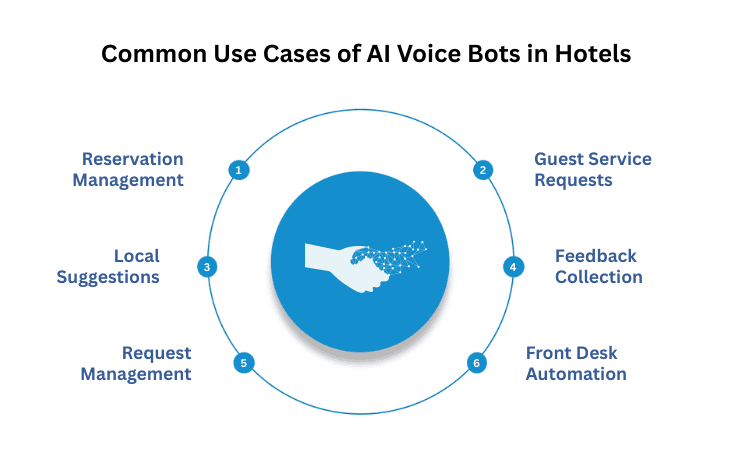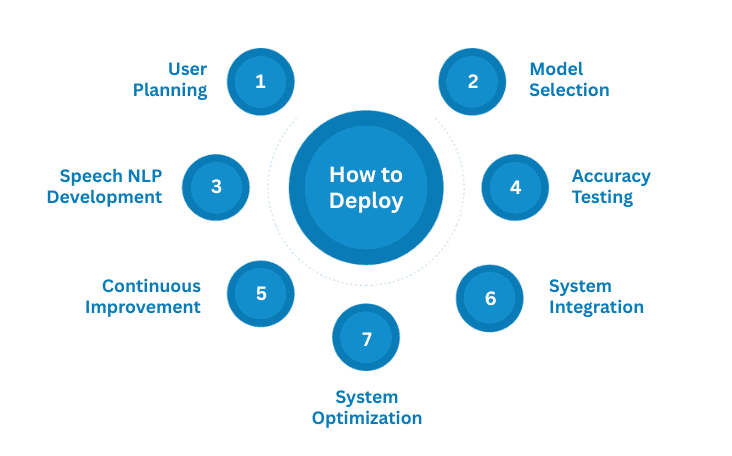Explore how AI voice automation is reshaping the hospitality industry, enhancing guest experiences, streamlining operations, and improving service.

Prithvi Bharadwaj
Updated on
January 27, 2026 at 5:20 PM

In the hospitality industry, guest expectations are constantly rising, especially when it comes to personalized experiences. Approximately 78% of hospitality companies expect voice-activated devices to become mainstream for controlling room settings like lighting and temperature.
This is a clear sign of how technology is shaping guest preferences. Yet, many businesses still struggle with offering efficient, round-the-clock service while maintaining high standards.
This blog will explore how AI voice automation is transforming hospitality services, from streamlining operations to enhancing guest experiences. We’ll explore how voice-powered solutions are enhancing everything from booking and check-in to in-room requests and customer support.
Key Takeaways
Enhanced Guest Experience: Voice assistants let guests control room settings and request services via voice commands, offering convenience and personalization.
Key Benefits: Voice automation ensures contactless service, 24/7 multilingual support, reduced wait times, and consistent, high-quality service.
Common Use Cases: Voice bots handle reservations, service requests, local recommendations, feedback collection, and complex tasks like room upgrades.
Integration Challenges: Key hurdles include smooth integration with existing systems, ensuring data security, balancing automation with a human touch, and managing costs and training.
Scalable Solutions: Voice automation offers scalable, secure solutions that streamline operations, integrate seamlessly with existing systems, and improve guest satisfaction.
What Is Voice AI in Hospitality?
Voice AI in hospitality refers to technology that allows guests to interact with hotel services using spoken commands. Voice recognition and NLP allow systems to let guests make requests and control their environment hands-free.
Voice AI enhances efficiency, convenience, and personalization, enhancing how hotels operate and guests interact with services. It keeps the hospitality experience modern and hassle-free.
How Do Voice Assistants Work?
Voice assistants in hospitality rely on a combination of key technologies to provide seamless and efficient service for guests:
Voice Recognition: This technology listens to and converts speech into text, allowing voice commands to be understood accurately.
Natural Language Processing (NLP): NLP helps interpret the meaning behind guest inquiries, ensuring that voice assistants respond in a relevant and context-aware manner.
Artificial Intelligence (AI) & Machine Learning: These technologies enable the voice assistant to learn from interactions, improving responses and accuracy over time.
System Integration: Voice assistants integrate with the hotel’s core systems. These include the Property Management System (PMS), Customer Relationship Management (CRM) software, and booking engines. This integration allows access to real-time data and enables personalized guest experiences.
Together, these components ensure that voice assistants sound sophisticated and deliver real operational value, making processes smoother for both guests and hotel staff.
Also Read: AI Assistants for Business: How They Work, Use Cases, and Top Platforms
Now that we've covered what voice AI in hospitality is, let's learn the key benefits it brings to both guests and hotel operations.
Key Benefits of Hospitality Voice Automation
Voice automation effectively eliminates some of the most common pain points for travelers. Here’s how voice automation is benefiting the hospitality industry:
Contactless Convenience: Guests can request services, adjust room settings, or ask for information without having to touch a phone or speak to a staff member.
24/7 Multilingual Support: Voice bots provide continuous, multilingual support, ensuring that international guests feel welcomed and understood, no matter where they’re from.
Reduced Wait Times: With voice bots handling routine inquiries, guests don’t have to wait in long queues, and staff can focus on more complex requests.
Personalized, Consistent Service: Voice bots deliver accurate information every time, maintaining consistency even when human staff changes. This ensures guests always get the same high-quality service.
Valuable Guest Insights: By collecting data on guest interactions, voice bots provide actionable insights that can help you better understand guest preferences and improve service delivery.
Voice automation boosts operational efficiency and guest satisfaction, helping hotels streamline their processes while delivering a higher level of personalized service.
Smallest.ai provides seamless voice automation that enhances guest experiences and streamlines operations. Our technology supports everything from contactless service to valuable insights. Contact us today to see how we can help personalize and optimize your hotel’s voice automation.
With these benefits in mind, let's take a look at the real-world applications of voice AI in hotels.
Common Use Cases of AI Voice Bots in Hotels

The use of voice automation in hotels is improving how guest services are provided, making processes faster and more efficient. Here are the most impactful ways AI voice bots are being implemented in the hospitality industry:
1. Reservation Management
Voice bots are now capable of handling the entire booking process. From checking availability to processing payments, these bots streamline reservations, reducing human error and speeding up the process.
2. Guest Service Requests
Voice bots allow guests to make service requests through simple voice commands. Requests like extra towels or room temperature adjustments are routed instantly to the right department, ensuring quick action without guests having to wait.
3. Local Recommendations
Voice assistants now serve as personalized concierges, offering tailored suggestions based on guest preferences. Voice bots consider real-time availability to provide guests with convenient and relevant options, such as local restaurant recommendations or activities, all at their fingertips.
4. Post-Stay Feedback Collection
After check-out, hotels can collect valuable feedback through AI voice assistants. Engaging guests in natural conversations allows hotels to collect valuable feedback, which can be used to improve future guest experiences and services.
5. Handling Complex Requests
Advanced voice bot systems can manage more intricate tasks such as room upgrades, loyalty program inquiries, and event planning. These capabilities further demonstrate the flexibility and increasing sophistication of AI in the hospitality industry.
6. Front Desk Automation
Advanced voice bot systems streamline check-in/check-out processes, handle frequently asked questions, and provide instant local recommendations. This enhances the overall guest experience and allows hotel staff to focus on delivering more personalized service.
Implementing voice automation in these areas boosts efficiency and enhances guest satisfaction, while allowing staff to focus on personalized, value-driven interactions.
Also Read: How Conversational AI Is Transforming Customer Engagement and Business Automation
Having seen how voice automation is applied, the next step is to understand how to deploy this technology successfully.
How to Deploy Hospitality Voice Automation

Successfully deploying voice automation in hospitality requires careful planning and an understanding of your unique needs. Here’s a step-by-step guide to ensure a smooth deployment process:
1. Plan and Understand User Requirements
Start by defining the core purpose of your voice automation. In hospitality, this could be handling service requests, managing support calls, or assisting internal teams.
Consider the needs of those interacting with the system, and set clear goals like improving response times, reducing manual work, or boosting guest satisfaction.
2. Select the Right AI Models
Choose the right technology for your hospitality needs. Look for AI solutions with natural language processing (NLP), speech recognition, and text-to-speech capabilities for smooth, clear communication.
Smallest.ai offers flexible AI models that are built to smoothly integrate with your existing systems, providing a customized solution that enhances guest interactions.
3. Build Speech Recognition and NLP Capabilities
Your system must recognize the specific jargon and phrases used in hospitality settings. Train the voice bot with real data from your business to ensure it understands accents, follow-up questions, and common phrases.
Ensure the bot can handle interruptions and escalate complex issues to a human agent seamlessly when necessary.
4. Test for Accuracy and Performance
Before going live, thoroughly test the voice bot in real-life scenarios in customer calls or hotel offices. Evaluate its speed, accuracy, and ability to perform under pressure. Use feedback from these tests to adjust and fine-tune the system for optimal performance.
5. Continuous Learning and Improvement
Once deployed, monitor how users interact with the voice bot. Look for any gaps or errors in communication. Use guest feedback and real-time data to retrain the bot, update workflows, and continuously enhance its accuracy and functionality over time.
6. Integration with Existing Systems
Ensure the voice automation integrates smoothly with your current hospitality systems, such as booking platforms, CRM, or property management tools. This helps provide a seamless experience for guests while enabling your team to access real-time data and respond efficiently.
7. Monitor, Optimize, and Maintain
Continuously track performance metrics like guest satisfaction, response times, and resolution rates. Regularly update the system based on performance reviews, guest feedback, and usage patterns. The goal is to keep the voice automation aligned with changing guest expectations and operational needs.
By following these steps, you can deploy hospitality voice automation that improves efficiency, reduces operational strain, and enhances guest experience.
Also Read: AI Enhancements in Hotel Customer Service: How Smart Voice Technology Is Transforming Hospitality
While deploying voice tech sounds ideal, it's important to be aware of the common challenges that can arise during the process.
Common Challenges of Hospitality Voice Automation
While the benefits of integrating AI voice automation in hospitality are clear, the journey to a successful implementation comes with its own set of challenges. Here are some key factors to keep in mind:
Technical Integration
Voice assistants must integrate smoothly with existing systems like property management software (PMS) and booking platforms. Poor integration can create friction and disrupt operations, impacting both staff efficiency and guest experience.
Data Privacy & Security
Protecting guest data is critical. Voice data needs to be encrypted and stored securely to meet privacy standards. Without strong security measures, guests may feel uneasy, and your business could face legal or reputational risks.
Balancing Automation with Human Touch
While AI can handle many tasks, it can’t replace the personal connection guests value. Finding the right balance between automation and human interaction is key to maintaining customer satisfaction.
Initial Investment
The upfront costs of implementing voice technology can be significant. Careful planning is necessary to ensure the long-term return on investment justifies the initial spend.
Staff Training
Without proper training, you risk underutilizing the system and missing out on its full potential. A solid plan and right technology partner can help ensure a smooth and successful implementation.
Considering these challenges effectively with a strategic plan and the right technology partner can help ensure a smooth and successful implementation.
Now that we've addressed the potential hurdles, let's explore some best practices to ensure you get the most out of your voice automation.
Best Practices for Hospitality Voice Automation
Moving from concept to implementation requires careful planning and thoughtful consideration. Here are the essential factors to keep in mind as you integrate voice technology into your hospitality services.
1. Start With A Focused Approach
Pick one key problem to solve. This could range from reducing call wait times to improving staff workflows or making guest interactions more efficient.
Test your solution using existing platforms like Alexa for Business or a simple custom setup to refine the process before expanding.
2. Design For Real User Behavior
Keep your responses short and clear. Long voice replies can frustrate users.
Consider environments where your voice tech will be used, like noisy hotel lobbies or shared spaces where privacy is important.
Always offer users an option to switch to other communication channels, like text or in-person, if needed.
3. Choose Technology That Fits Your Goals
Ensure the platform supports natural, goal-focused conversations for an intuitive experience.
Ensure the voice system can understand diverse accents, contexts, and commands specific to the hospitality industry.
Consider whether to use speaker-dependent systems for added security or speaker-independent systems for more flexibility.
4. Build The Right Tech Stack
Identify the necessary tools such as speech-to-text, text-to-speech, noise cancellation, and possibly biometric ID.
Choose whether to deploy on the cloud for scalability, use embedded systems for speed, or use APIs to build quickly with tools from providers like Google or Amazon.
5. Prioritize Privacy And Security
Voice data is sensitive, especially in hospitality. Ensure encryption, access control, and compliance with privacy standards.
Be transparent about how customer data is handled, stored, and used.
6. Plan For Connectivity And Future Growth
Voice AI should integrate with your existing systems, such as CRMs, databases, or helpdesk platforms, to ensure seamless operation.
Make plans for how the system will scale with additional features or increased usage as your business grows.
7. Test As If It’s Live
Run tests with a variety of voices, accents, and speech styles to ensure your system can handle real-world scenarios.
Simulate both successful interactions and potential failures to ensure quick recovery and smooth performance under pressure.
8. Partner With Experienced Providers
Collaborating with a trusted voice tech partner can fast-track your implementation process.
Work with teams who understand the specific challenges of the hospitality industry and can guide you through the latest trends and updates.
9. Iterate After Launch
Start with a minimum viable product (MVP), test its functionality, and make adjustments based on user feedback.
Voice technology is an ongoing project; Continually refine the system based on real-world data and evolving user needs.
When done right, voice AI can become an integral part of how you operate and deliver exceptional service in the hospitality industry.
Conclusion
AI voice automation is enhancing the hospitality industry by streamlining operations and enhancing the guest experience. However, successfully integrating this technology requires careful planning and attention to the challenges of technical integration, balancing automation with human interaction, and staff training.
Implementing voice automation in these areas boosts efficiency and enhances guest satisfaction, while allowing staff to focus on personalized, value-driven interactions.
Smallest.ai provides innovative solutions to seamlessly integrate AI voice technology into your hospitality operations. Designed to enhance guest experiences and improve operational efficiency, this tool helps you streamline your workflows.
Key offerings include:
Real-Time Voice Cloning: Create personalized, lifelike voices that enhance guest interactions and provide a consistent, branded experience.
Advanced Text-to-Speech (TTS): Deliver high-quality, multilingual speech for smooth communication with international guests.
Seamless System Integration: Effortlessly integrate voice bots with your property management systems, booking platforms, and in-room controls.
Scalable Solutions: Whether you're running a small boutique hotel or a large chain, our solutions are designed to grow with your business.
Data Security & Compliance: Ensure your guest data is securely encrypted and stored, meeting industry standards like SOC 2 Type II, HIPAA, and GDPR.
24/7 Support: Our team offers continuous support to help you get the most out of your AI voice automation.
Get in touch with Smallest.ai today to explore how our AI voice solutions can enhance your hospitality services and improve guest experience.
Frequently Asked Questions (FAQs)
1. What is hospitality voice automation?
Hospitality voice automation uses AI technology to help guests interact with hotel services through voice commands. Voice assistants simplify the guest experience, from adjusting room temperature to requesting housekeeping, making each interaction more seamless and personalized.
2. How does voice automation improve guest experience?
Voice automation streamlines routine tasks like check-ins, service requests, and in-room controls, providing guests with a faster, hands-free way to manage their stay. It also offers 24/7 support in multiple languages, making sure every guest feels attended to.
3. Is it hard to integrate voice technology into existing hotel systems?
Integration can be challenging, but with the right tools, it’s possible. Ensuring seamless integration with your property management, booking, and guest service systems is key. Smallest.ai provides solutions built for easy integration.
4. How secure is voice technology when handling guest information?
Voice data is highly sensitive, especially in the hospitality industry. Ensuring proper encryption and compliance with privacy standards like GDPR is crucial. Smallest.ai offers strong data security measures to protect guest data and comply with industry standards.
5. What are the long-term benefits of using voice automation in hotels?
Voice automation not only improves guest satisfaction but also enhances operational efficiency. By automating routine tasks, staff can focus on providing more personalized service.

Automate your Contact Centers with Us
Experience fast latency, strong security, and unlimited speech generation.
Automate Now


